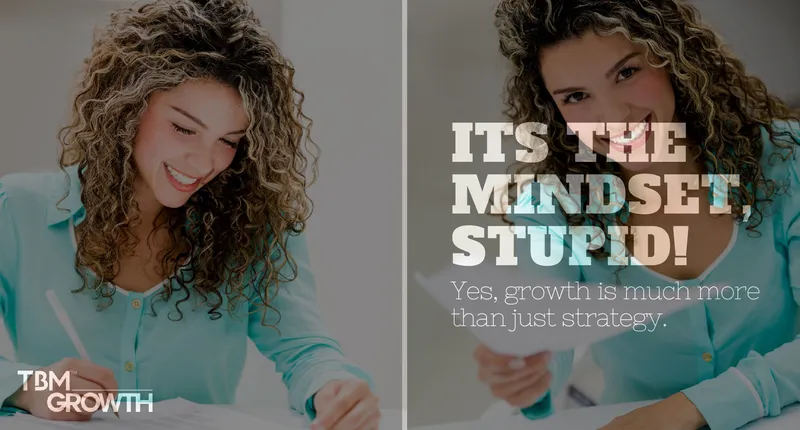

It's the mindset that is stupid!
Yes Growth is much more than strategy.

Can you teach a panda to play the piano? The answer, of course, is no. Unless the panda really, really wants to. Then, well, you never know what can happen.
Let us gently step away from the possibilities of the above scenario (the panda can take things forward from here), and see what the premise might mean for modern companies looking to unleash growth across the rank and file. The question is simple: Can you grow just because you want to?
It is generally accepted by experts (and corroborated by common sense) that all action ultimately stems from desire. The saints (‘muni’s and ‘rishi’s) of ancient India, for instance, was known to make miracles happen without moving a muscle – simply via the powers of the mind.
Wouldn’t it be peachy if your CTO, CMO or even that new trainee could do that? Chances are – with the right motivation buttons (desire) and effort (preparation and practise) - they can.
After all, recent advances in neuroscience confirm that our brains are far more malleable – and, by extension, capable - than we tend to give them credit for. With time and effort, neural networks in our minds can sprout new connections, revitalize old ones and speed up impulse transmission.
In other words, we can boost our own mind’s growth by inculcating new habits and doing new things. Moral: When we mix it up, we grow. When we fix it up, we don’t.
-(1).png?fm=png&auto=format)
The big question for companies, therefore, becomes: If you want to grow fast and right, what do you mix-in-to your current strategy? And equally importantly, what are the stuff you un-fix?
You can create a Growth Mindset by mixing-in the conviction.
Your team’s got the talent. Your office has got the technology. You even got the best practices in place. Is there something you may be lacking? Probably.
How about throwing in a little ‘CAN DO – WILL DO’ attitude into the mix?
Nothing is more powerful than a mind that believes it is. How does one embed that sort of thing across the organizational fibre? Build a culture of positive expectation - minus the pressure baggage. Let your workers know that the company is counting on them to rock (and that the company wouldn’t have hired them in the first place if it didn’t believe in their ability to deliver).
The premise that positive expectations influence performance positively is known as the Pygmalion effect: The legend stems from a sculptor in Greek mythology who so fell in love with a statue of his own making, that it turned into a real-life being (with, of course, a little help from Aphrodite - the Goddess of love). Then there’s the ‘Sense-of-Purpose’ psychology intervention test conducted on a group of teens that found that linking school work to a meaningful, larger purpose – such as, say, making a positive difference to society - was almost as effective as a formal ‘growth-mindset’ training.
So go ahead and fire up your teams by linking them to a special, bigger ‘plan’. Make things thrilling every minute. And set the bar delightfully high. But – and here’s something equally critical - don’t forget to back it up with the right support. Empower them in every way you can. Share insightful, constructive and actionable feedback. Offer learning opportunities.
Make sure they can relax. Keep them motivated by reminding them of their strengths. Allow for a free flow of ideas and conversations. Have them participate in key decision-making moments. Create paths for rising up the rope ladder. Finally, follow it up with a warm pat on the back: A thoughtfully personalized rewards system can be the perfect icing after a virtuoso performance by a team member.
Build a growth mindset by UN-FIXING whatever’s holding ‘em back.
As you mix it in, you must do the reverse too - un-fix and un-hinge set patterns and bottlenecks that are getting in the way of nurturing a ‘growth mindset’ in your organization. Everything team has its own ‘fixations’ that it needs to address and overcome. That can mean anything from unclear priorities, excessive pressure, poorly designed workplaces, technology challenges, restrictive policies, un-inspiring cultures, indifferent management, or, well, anything in between. If you want to plant the seeds of a winning attitude, you must weed these out first.
Businesses grow not through ability, but by believing “I am able”.
It’s not about falling seven times, but about getting back up eight. It’s not about wishing for miracles, but believing that they can actually come true. And it’s what real life heroes like Martin Luther King (Jr), Helen Keller and Muhammad Ali (to name a random cross-section) possess(ed) in oodles.
When you mix and un-fix, what you do in effect, is set in motion a growth-mindset engine that runs on auto-pilot, yielding incremental returns over time. As a bonus, it has been found that triggering self-belief (by ‘mixing it in’) encourages workers to try new things, discover hidden talents and stumble upon untapped strengths. For the organization, that’s a delicious win-win.
Probably the best part? You don’t have to worry about the system crashing one fine afternoon, because the insatiable appetite for growth is now coming from a very fundamental, very personal, very powerful spot: Desire.
So what are YOU going to mix and un-fix, to grow on auto-pilot in 2018?
What do YOU think is the biggest difference between the two?







